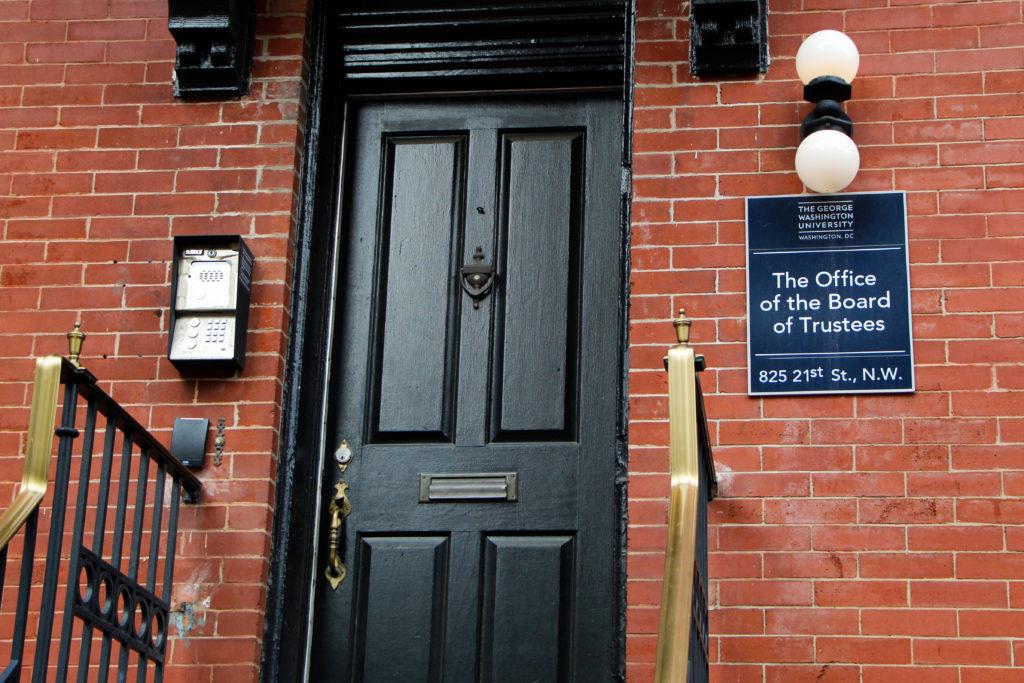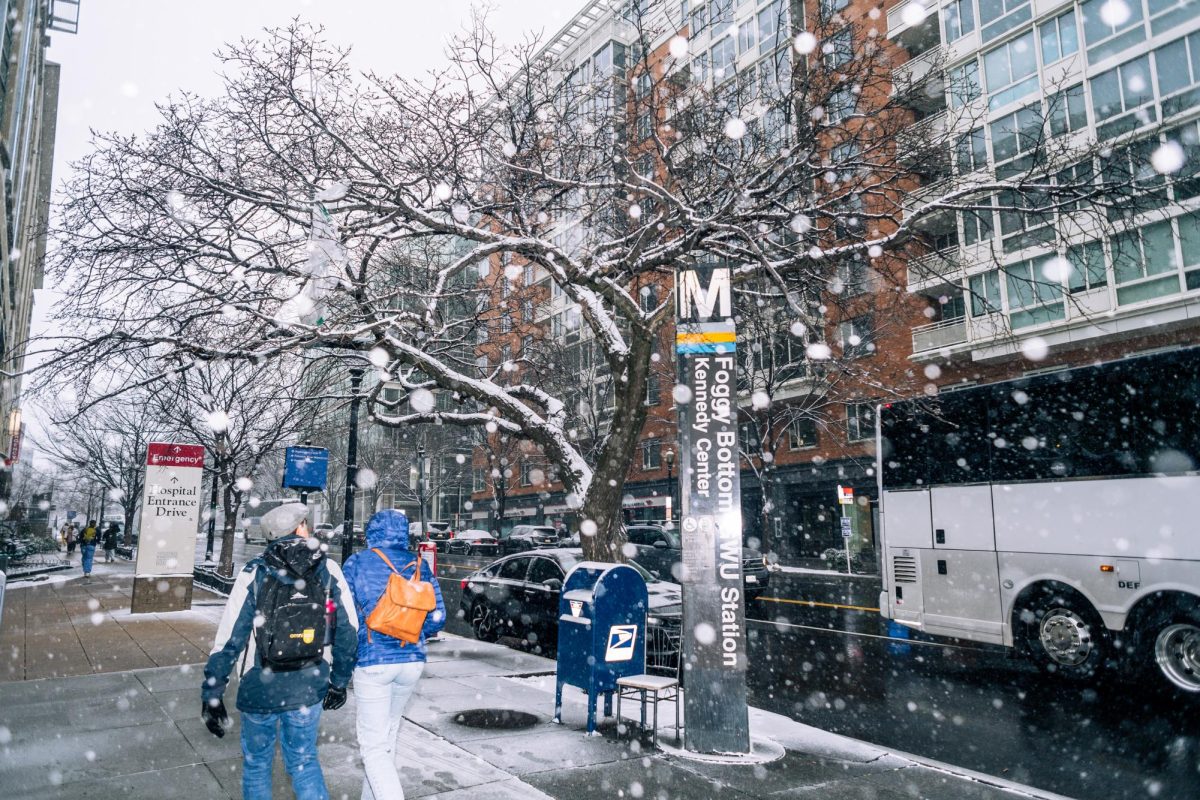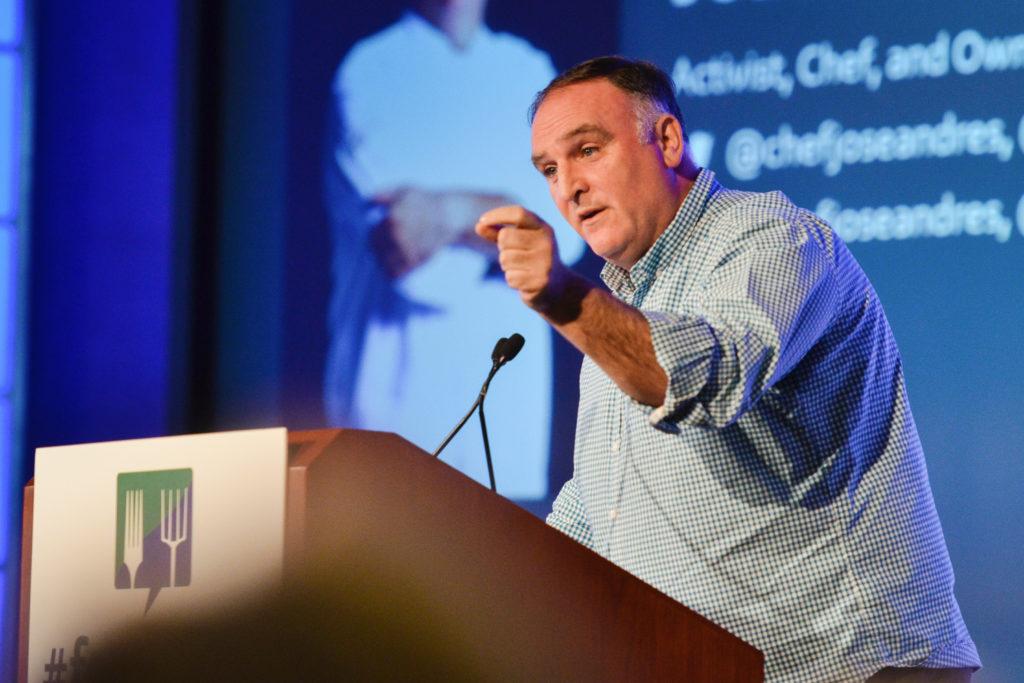The Board of Trustees could announce whether they will change the Colonials moniker, approve a set of shared governance principles and deliver an update on the search for a permanent president at their final meeting of the academic year Friday.
Board Chair Grace Speights said trustees would announce their decision on the Colonials moniker before the end of the academic year after the Special Committee on the Colonials Moniker delivered a set of recommendations to change the name. Trustees are also expected to sign off on a set of shared governance principles that the Faculty Senate approved last month on how trustees, administrators and faculty will work together going forward after years of contention between the groups.
After the Board launched the search committee in April, trustees could give another update or outline the timeline for the process.
This will be the third time the Board has met publicly this academic year, after trustees reviewed the University’s finances and introduced interim University President Mark Wrighton at previous meetings this year.
Here’s what to look out for Friday:
Changing the Colonials moniker
GW community members have criticized the Colonials moniker for years, citing the moniker’s “offensive” nature. Trustees established a framework for officials to study and rename the moniker in June 2020, and former University President Thomas Leblanc formed the Special Committee on the Colonials Moniker – chaired by research professor of law and Ward 3 Council member Mary Cheh – to evaluate the moniker a month later.
The Colonials moniker has already started losing its presence in University programing and marketing throughout this academic year, even before officials have announced their decision on whether or not to ditch the moniker. Officials renamed a program once called Coffee with Colonials to Coffee with Alumni in the fall of 2019, following years of student criticism.
Alongside the Colonials moniker committee, Leblanc formed a second committee to evaluate the renaming of the building formerly known as the Cloyd Heck Marvin Center, named after a former University president who promoted a series of racist and anti-Semitic policies like barring civil rights activists from speaking at GW and later corresponding with the Klu Klux Klan.
Leblanc had said he expected both of the committees to make their recommendations in the spring of 2021, and trustees voted to rename the Marvin Center last summer to the University Student Center.
Codifying shared governance principles
Following years of contention between faculty members and officials over the University’s system of shared governance, the Board could also approve a set of principles approved by the Faculty Senate last month on how faculty, administrators and trustees will play a joint role in GW’s decision making.
In February 2020, faculty senators criticized officials for violating “established principles of shared governance” after they said trustees approved the now-obsolete 20/30 plan to cut undergraduate enrollment by 20 percent and enroll at least 30 percent of undergraduates in STEM fields without gauging faculty feedback.
In October, the Board formed a task force made up of faculty, administrators and trustees to evaluate GW’s system of shared governance and collaboration between the different groups after faculty expressed an “overwhelmingly negative” view on University leadership in a survey last April.
“We wanted to establish the general principle that we’d be working collaboratively to address these and identifying these issues, with the understanding that we’ll be doing that this year, next year and through the out-years into our third century,” Provost Chris Bracey said at last month’s Faculty Senate meeting.
This March, officials released the results of a survey that measured faculty, administrators’ and trustees’ feelings on the future of shared governance. The majority of Board members favored full control over the areas like the presidential search and strategic planning, with faculty and administrators wanting the three groups to share in the decision-making. Still, the groups generally agreed on the importance of communication and a “culture of respect” at GW.
Last month, the Faculty Senate approved a set of shared governance principles after a series of town halls and a University-wide survey between officials and faculty in January. While the resolution fell short of amending GW’s governing documents, it highlighted faculty members as having a role in “key decision making” and recommended that the Board evaluate the University president’s commitment to shared governance in its periodic evaluations.
“I believe the documents that we have are going to serve us well,” Wrighton said at the senate meeting. “This has been indicated as a living document. I, for one, look forward to working with Chris Bracey, with the faculty and of course with the Board of Trustees to implement what we have resolved.”
Presidential search updates
The search for the University’s next permanent president has also headlined another one of the Board’s top priorities this year. Board of Trustees Chair Grace Speights announced the formation of a new presidential search committee last month, making the first major step in the search for a permanent university president.
After Leblanc departed GW at the end of the fall semester, Wrighton took over as interim University president in the spring and will serve for up to 18 months in GW’s top spot.
Since Speights announced the launch of the search committee late last month, officials have yet to indicate the timeline for the upcoming stages of the process, which include the hiring of an outside search firm and developing a profile on the Board’s preferred type of candidate.
The search committee includes representatives from the Board, administrators, faculty and the incoming presidents of the Student and Alumni associations, with a trustee serving as its chair and faculty member vice chairing the body. The previous search committee – which ended when the Board hired Leblanc in 2017 – had a similar number of representatives from the different University groups.
Speights said the committee – along with the Faculty Senate’s executive committee and the faculty consultative committee – would join the Board at their June retreat to start their presidential search work over the summer. The Board will likely choose either an outside search firm to help officials search for candidates for the position or outline the qualifications and vision for their preferred candidates next in the process, if they follow a similar timeline to the last presidential search for LeBlanc.
“At the dawn of the University’s third century, we are looking for a leader who will reinforce our commitment to academic excellence, enhance our academic reputation and help us achieve our aspirations for preeminence,” Speights said in an email to community members late last month.








